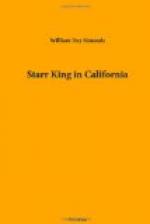“Terrible indictments” truly, and in the storm and tempest of the time irresistibly attractive to men and women whose sympathies were on fire for the Northern cause. King’s patriotism won for him a liberal hearing on subjects that otherwise the people would have declined to consider.
But we must not forget that “our preacher” was endowed with that rare and radiant gift, an altogether charming and persuasive personality. Appearance, manner, voice, were all instruments of attractiveness, fitting modes of expression to a gentle and noble spirit. When a friend and comrade of King’s earlier ministry was asked to name the preacher’s preeminent gift, he immediately answered, “his voice.” The reply seems trivial. Yet it was seriously spoken by one whose knowledge of King during his Boston ministry was close and personal. William Everett, who had listened to New England’s renowned orators, to Emerson’s sweet and satisfying voice, and. to the music of Wendell Phillip’s speech, said of King, “His was one of the noblest and sweetest voices I ever heard.” Edward Everett Hale once wrote, “Starr King was an orator, whom no one could silence and no one could answer.” Says another, “There was argument in his very voice. It thrilled and throbbed through an audience like an organ carrying conviction captive before its wonderful melody.” If it is true that William Pitt once ruled the British Nation by his voice, as good authority affirms, if it is true, that Daniel O’Connell’s voice
Glided easy as a bird may glide,
And played with each wild passion as it went,
may it not also be true that Starr King’s clear, penetrating, musical voice, answering to the moods of the soul as a loved instrument to the hand of the player, was in itself a kind of gospel of good will to men?




